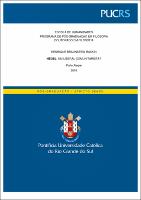| Share record |


|
Please use this identifier to cite or link to this item:
https://tede2.pucrs.br/tede2/handle/tede/8723| Document type: | Tese |
| Title: | Hegel : um liberal-comunitarista? |
| Author: | Raskin, Henrique Braunstein  |
| Advisor: | Weber, Thadeu |
| Abstract (native): | O objetivo desta tese é o de demonstrar que é possível fazer uma leitura liberal da obra política de Hegel, caracterizando o filósofo como liberal-comunitarista. Uma leitura dialética de liberalismo, a romper com o dualismo excludente entre liberais e comunitaristas, permite entender o próprio liberalismo não como uma doutrina a priori, mas como produto do desenvolvimento histórico da experiência humana em comunidade. É defender que a liberdade individual, tão cara à doutrina liberal, não se contrapõe à condição comunitária da formação da subjetividade, mas que é a partir da própria intersubjetividade que se efetiva a liberdade individual enquanto categoria fundamental do direito e, assim, da política. A tomada da Filosofia do Direito, a partir da dialética das modalidades na Ciência da Lógica, entenderá a conservação do Direito Abstrato e da Moralidade na Eticidade, tal como conceberá, também, não apenas a conservação da família e da sociedade civil-burguesa no Estado, mas também o seu status enquanto essência e endosso das instituições políticas. Esse será o pivô da compreensão de que o próprio liberalismo não pode ser tomado fora de sua efetivação comunitária, sendo a sociedade civil-burguesa o espaço da particularidade, do interesse privado, das carências, do trabalho e da cultura, e sendo ela a esfera determinante das condições e circunstâncias para a emergência das instituições políticas universais. |
| Abstract (english): | The aim of this thesis is to demonstrate that it is possible to make a liberal interpretation of Hegel's political work, characterizing the philosopher as a liberal-communitarianist. A dialectical reading of liberalism, to disrupt the exclusionary dualism between liberals and communitarianists, allows one to understand liberalism not as an a priori doctrine, but as a product of the historical development of human experience in community. It is to defend that individual freedom, so dear to the liberal doctrine, does not contradict the communitarian condition of the constitution of subjectivity, but it is from the very intersubjectivity that individual freedom becomes actual as a fundamental category of law, and, thus, of politics. The taking of the Philosophy of Right, from the logical modalities in the Science of Logic, will understand the conservation of the Abstract Right and of Morality in the Ethical Life, just as it will conceive not only the conservation of the family and of civil society in the State, but also its status as the essence and endorsement of political institutions. This will be the pivot of the understanding that liberalism itself cannot be taken away from its communitarian actualization, being civil society the space of particularity, of private interest, of needs, of work and of culture, and being it the determinant sphere of conditions and circumstances for the emergence of universal political institutions. |
| Keywords: | Liberalismo Comunitarismo Idealismo Alemão Ética Hegel |
| CNPQ Knowledge Areas: | CIENCIAS HUMANAS::FILOSOFIA |
| Language: | por |
| Country: | Brasil |
| Publisher: | Pontifícia Universidade Católica do Rio Grande do Sul |
| Institution Acronym: | PUCRS |
| Department: | Escola de Humanidades |
| Program: | Programa de Pós-Graduação em Filosofia |
| Access type: | Acesso Aberto |
| Fulltext access restriction: | Trabalho será publicado como artigo ou livro |
| Time to release fulltext: | 48 meses |
| Date to release fulltext: | 17/06/2023 |
| URI: | http://tede2.pucrs.br/tede2/handle/tede/8723 |
| Issue Date: | 27-Mar-2019 |
| Appears in Collections: | Programa de Pós-Graduação em Filosofia |
Files in This Item:
| File | Description | Size | Format | |
|---|---|---|---|---|
| TES_HENRIQUE_BRAUNSTEIN_RASKIN_COMPLETO.pdf | HENRIQUE_BRAUNSTEIN_RASKIN_TES | 1.1 MB | Adobe PDF |  Download/Open Preview |
Items in DSpace are protected by copyright, with all rights reserved, unless otherwise indicated.




